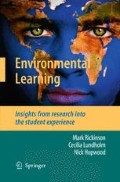Abstract
In this chapter we present a brief discussion of how the term ‘environmental learning’ has been defined and explained in the literature, and the complex range of activities, interests, contexts and purposes that it can encompass. We then detail what we mean and how we engage with the term, by discussing the who, what, where, how, and why of environmental learning. For each of these we illustrate how the focus of this book (which arises from the empirical contexts upon which it is based) in some ways reflects the diversity of environmental education (as with the areas of content addressed), but in others is quite narrowly focused on specific aspects (as with our emphasis on formal settings).
Access this chapter
Tax calculation will be finalised at checkout
Purchases are for personal use only
References
Boyes E, Stanisstreet M (1996) Threats to the global atmospheric environment: the extent of pupil understanding. Int Res Geogr Environ Educ 5(3):186–195
Cooper P, McIntyre D (1993) Commonality in teachers’ and pupils’ perceptions of effective classroom learning. Br J Educ Psychol 63:381–399
DfEE/QCA (1999) Geography: The National Curriculum for England, Key Stages 1–3. HMSO, London
Dole JA, Sinatra GM (1998) Reconceptualizing change in the cognitive construction of knowledge. Educ Psychol 33(2/3):109–128
Falk JH (2005) Free-choice environmental learning: framing the discussion. Environ Educ Res 11(3):265–280
Fourth International Conference on Environmental Education (2007) Moving forward from Ahmebadad … environmental education in the 21st century. Accessed 28 November 2008 from http://www.tbilisiplus30.org/Final%20Recommendations.pdf
Hart P (2007) Desires and resistances as drivers and barriers to environmental learning and sustainability: a Canadian perspective. In: Bjorneloo I, Nyberg E (eds) Drivers and barriers for implementing learning for sustainable development in pre-school through upper secondary and teacher education. ESD in action technical paper No 4. UNESCO, Paris
Hutchinson F (1997) Our children’s futures: are there lessons for environmental educators? Environ Educ Res 3(2):189–201
Jovchelovitch S (2007) Knowledge in context: representations, community and culture. Routledge, London
Lundholm C (2008) Contextualisation and learning in economics: an intentional perspective on the role of values. Paper presented at the 6th International Conference on Conceptual Change, European Association for Research in Learning and Instruction, Turku, 22–25 August
Myers M (2006) Environmental learning: reflections on practice, research and theory. Environ Educ Res 12(3/4):459–470
Nagel NG (1996) Learning through real-world problem solving: the power of integrative teaching. Corwin, Thousand Oaks, CA
Nagel M, Lidstone J (2008) Green doesn’t always mean go! Children’s conceptions of environmental education. VDM Verlag Dr Müller Aktiengesellschaft & Co KG, Saarbrucken
Nespor J (1987) Academic tasks in a high school English class. Curriculum Inq 17(2):202–228
Österlind K (2006) Emotionella faktorers roll i begreppsbildning/The role of emotional factors in students’ concept formation. Research report no 73, Department of Education, Stockholm University, Stockholm
Randler C, Ilg A, Kern J (2005) Cognitive and emotional evaluation of an amphibian conservation program for elementary school students. J Environ Educ 37(1):43–52
Rickinson M, Lundholm C (2008) Exploring students’ learning in environmental education. Cambridge J Educ 38(3):341–353
Roper Starch Worldwide (1994) Environmental attitudes and behaviors of American youth with an emphasis on youth from disadvantaged areas (ED 381 599). National Environmental Education and Training Foundation, Washington, DC
Rosiek J (2003) Emotional scaffolding: an exploration of the teacher knowledge at the intersection of student emotion and the subject matter. J Teach Educ 54(5):399–412
Schoenfeld AH (2004) Multiple learning communities: students, teachers, instructional designers, and researchers. J Curriculum Stud 36(2):237–255
Shanahan M, Meyer JHF (2006) The troublesome nature of a threshold concept in economics. In: Meyer J, Land R (eds) Overcoming barriers to student understanding: threshold concepts and troublesome knowledge. Routledge, London
Sterling S (2004) The learning of ecology, or the ecology of learning? In: Scott W, Gough S (eds) Key issues in sustainable development and learning: a critical review. RoutledgeFalmer, London
Stevenson R, Dillon J (forthcoming) Engaging environmental education: learning, culture and agency. Sense, Rotterdam
Tilbury D (1998) The ‘how’ of environmental education. Environ Educ, Spring 1998:16–19
Vare P, Scott W (2007) Learning for a change: exploring the relationship between education and sustainable development. J Educ Sustainable Dev 1(2):191–198
Author information
Authors and Affiliations
Corresponding author
Rights and permissions
Copyright information
© 2009 Springer Science+Business Media B.V.
About this chapter
Cite this chapter
Rickinson, M., Lundholm, C., Hopwood, N. (2009). What Is Environmental Learning?. In: Environmental Learning. Springer, Dordrecht. https://doi.org/10.1007/978-90-481-2956-0_2
Download citation
DOI: https://doi.org/10.1007/978-90-481-2956-0_2
Published:
Publisher Name: Springer, Dordrecht
Print ISBN: 978-90-481-2955-3
Online ISBN: 978-90-481-2956-0
eBook Packages: Humanities, Social Sciences and LawEducation (R0)

